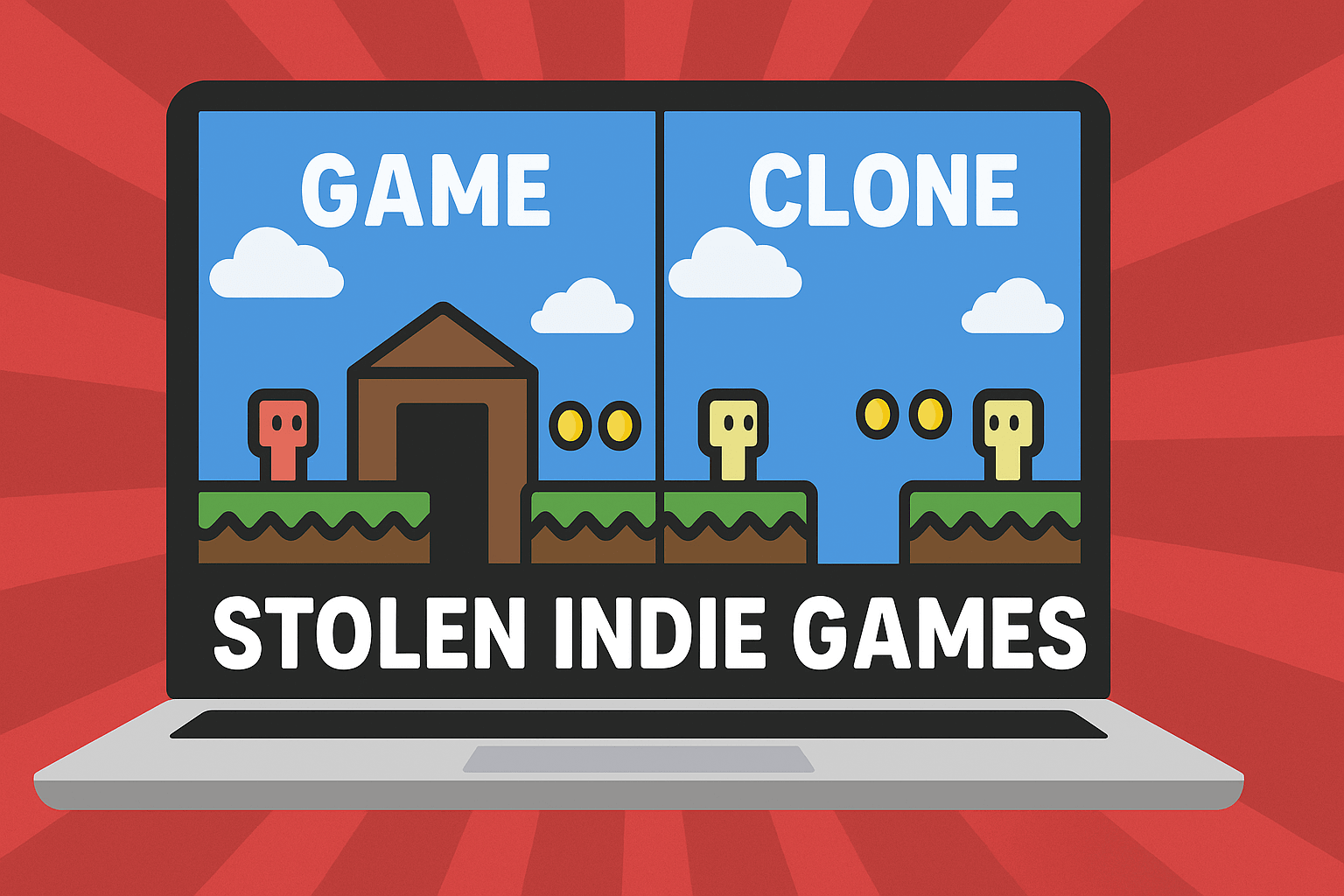
Image this: you’ve spent late nights coding, drawing pixel artwork till your wrist cramps, and balancing your recreation’s issue till it lastly feels proper.
You hit “publish” on itch.io, have a good time with pizza, and bask within the glow of being a Actual Recreation Developer™.
Then, every week later, somebody sends you a hyperlink: your recreation is on Steam… besides you didn’t put it there. Identical mechanics, similar artwork, completely different title. And another person is pocketing the gross sales.
Welcome to the wild west of stolen indie video games and online game cloning. As an indie dev myself, I’ve seen this nightmare occur to pals, learn the horror tales on Reddit, and nervous about it each time I hit “add.”
Let’s break down what’s occurring, why it’s rising, and what you’ll be able to truly do if it occurs to you.
Key Takeaways
- Stolen indie video games and recreation cloning are more and more widespread, particularly shifting from itch.io to Steam.
- Builders threat dropping income, fame, and motivation when clones seem.
- Defend your work with proof of possession, obfuscation, and DMCA instruments.
- Platforms are gradual to react, so indie devs should lean on group help and consciousness.
What Does “Stolen Indie Recreation” Actually Imply?
Cloning vs. Straight Theft
Generally thieves seize your recreation wholesale, zip file, property, the whole lot, and simply plop it on Steam or a cell retailer. Different instances, they re-skin it, change a reputation or two, perhaps swap the colour palette, and voilà: a “new” recreation. That’s online game plagiarism in motion.
Platforms The place This Occurs Most
- itch.io to Steam: Most likely the commonest pipeline proper now.
- Cellular app shops: Apple and Google Play each have histories of clones and asset flips sneaking in.
- Shady aggregator websites: Even crypto-themed websites have copied itch.io’s design and hosted stolen titles.
Actual Examples of Indie Video games Being Stolen
From itch.io to Steam
One dev’s card-battler, Dire Decks, was lifted and re-released on Steam underneath the title Wildcard. The thief didn’t even hassle to cover the similarities. That’s Steam stolen indie video games at its worst.
Hijacked Accounts
I’ve seen itch.io threads the place somebody’s account received hijacked and stuffed with grownup shovelware they by no means created. Think about logging in to seek out your title hooked up to a recreation you’d by no means let your mother see.
Web3 / Rip-off Platforms
Some crypto websites have actually cloned itch.io’s interface and pulled video games over with out permission. It’s the equal of somebody making a knockoff Walmart and stocking it with stolen items.
Tales from Fellow Devs
On Reddit, one dev shared that their online game was stolen, renamed, and offered on the App Retailer, basically wrapped in a webview.
Others on Twitter/X have caught clones of their browser video games popping up with new titles. The widespread theme? It retains occurring, and the thieves not often get punished quick sufficient.
Why Is This Occurring Extra Usually?
Low Obstacles to Entry on Platforms
Steam’s Direct program makes publishing low cost and comparatively straightforward, nice for us trustworthy indies, however equally nice for dangerous actors.
Shovelware Tradition
Should you’ve browsed the Steam “New Releases” web page recently, you already know what I imply: infinite low-quality asset flips and cloned video games. The aim isn’t to construct one thing memorable; it’s to churn out as many low cost merchandise as potential.
Visibility and Moderation Weaknesses
Steam depends on reviews, not preemptive checks. Should you don’t catch it, it might sit there for weeks.
Straightforward-to-Steal Digital Property
Video games are digital information. Except you construct in safety, anybody can obtain, rip, and republish them.
The Impression on Indie Builders
Misplaced Income and Recognition
Each stolen sale is cash you don’t earn, and as novices, even $50 can imply protecting software program prices or groceries.
Model Confusion
Gamers might not know which recreation is the unique. Worse, they may purchase the knockoff, have a foul expertise, and go away your actual recreation a adverse overview.
Emotional and Neighborhood Fallout
Truthfully? It’s crushing.
I’ve had pals admit they virtually stop making video games after seeing their recreation stolen. While you’re already combating imposter syndrome, having your recreation cloned feels just like the universe confirming your worst fears.
What You Can Do If Your Recreation Is Stolen
Rapid Steps
- File a DMCA takedown with the platform (Steam, itch.io, Apple, Google).
- Attain out to the storefront’s help crew instantly.
Defending Property Earlier than Launch
- Don’t add uncooked asset information in the event you don’t need to.
- Obfuscate or encrypt code when potential.
- Preserve unfinished builds personal.
Constructing Proof of Possession
- Preserve a dev log, commit historical past, screenshots, drafts, as your paper path.
- Archive prototypes and main milestones so dates and authorship are clear.
Leaning on the Neighborhood
- Use indie dev Twitter/X, Reddit, and Discords to share your story and rally help.
- Encourage gamers to wishlist and overview the unique; visibility issues.
How Platforms Are Responding (and Falling Quick)
Steam’s Moderation Struggles
Valve removes stolen indie video games when flagged, nevertheless it’s typically gradual. In the meantime, the thief may pocket gross sales.
itch.io’s Function
Itch.io is beloved by indies however doesn’t have the identical sources as bigger platforms. They rely closely on reviews and handbook intervention.
Broader Trade Strain
The indie group is asking for higher verification instruments, automated plagiarism detection, stricter account checks, and sooner takedown programs.
Shovelware, Clones, and the Indie Market
The Flood of Low-High quality Video games
Shovelware and stolen video games muddle the market, burying high quality indies in noise. Steam is especially notorious for this.
Classes from Different Artistic Fields
It’s the identical struggle musicians, artists, and writers face with piracy and plagiarism. As soon as one thing is digital, defending it’s an uphill battle.
Why This Issues for Indie Growth
If platforms don’t deal with this downside, it might discourage new devs and poison participant belief in indie video games general.
FAQ: Stolen Indie Video games
How do I report a stolen recreation on Steam?
Head to the sport’s Steam retailer web page, scroll to the underside, and use the “Report this product” button. Select copyright infringement as the rationale.
You’ll additionally need to file a DMCA takedown by way of Valve’s internet type. Embody screenshots, growth logs, and your authentic itch.io or Steam web page to show possession.
Can stolen indie video games actually become profitable on Steam?
Sadly, sure. Even when a clone solely sells a handful of copies earlier than getting taken down, that’s cash the thief pockets — and recognition you lose. Some shovelware publishers crank out dozens of those directly, hoping to slide underneath the radar.
What’s the distinction between shovelware and a stolen recreation?
Shovelware normally means low-effort video games, asset flips, reskins, issues made to flood the shop relatively than impress gamers. A stolen recreation is your precise venture taken with out permission, both re-uploaded as-is or with minor tweaks.
Generally the 2 overlap, which makes it much more irritating.
How can I shield my indie recreation from theft?
You may’t 100% cease it, however you may make life tougher for thieves. Use code obfuscation, hold dev logs as proof, and solely add the minimal information wanted.
Most significantly: doc your growth course of. Screenshots of prototypes, commits in Git, or devlogs on social platforms can double as proof of authorship.
Does this occur exterior of Steam and itch.io?
Completely. Cellular app shops are infamous for clones, particularly in case your recreation begins trending. Browser video games and even console storefronts have seen it too. Anyplace there’s cash and a low barrier to entry, you’ll discover somebody making an attempt to chop corners.
The place to Go From Right here
As indie devs, we already juggle coding, artwork, advertising and marketing, and community-building. Preventing indie recreation theft wasn’t alleged to be a part of the job description — but right here we’re.
We will’t lock down the web, however we are able to shield ourselves with good practices, share tales when theft occurs, and help each other. The thieves could also be quick, however the indie group is scrappy, passionate, and harder than they anticipate.
And hey, perhaps sometime we’ll look again and chuckle: “Keep in mind when Steam was the Wild West of cloned video games?” Till then, hold constructing, hold sharing, and don’t let the shovelware crowd steal your spark.
Major Sources Cited



